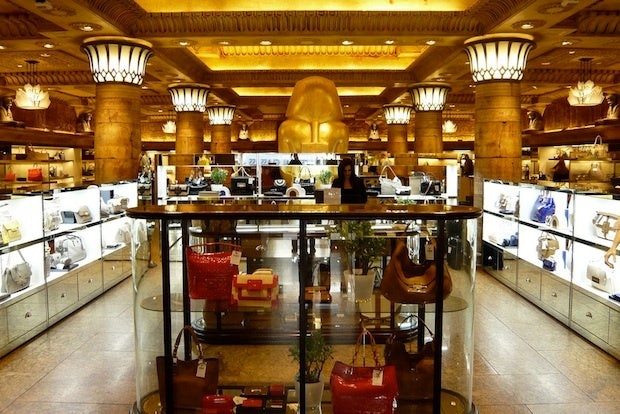
Harrods is one UK retailer that has been campaigning to loosen visa restrictions for Chinese visitors. (Herry Lawford/Flickr)
In an effort to attract high-spending Chinese tourists and investment dollars, Britain announced this week it would relax visa requirements for visitors from the mainland, a development for which the country’s luxury retailers have long fought. Under the new rules, regular visitors and businesspeople will be allowed to apply for a 24-hour priority visa instead of having to wait for up to a week. The UK will also pilot a joint visa application with other European countries.
“The visa service wanted to make the changes to ensure that the UK is one of the most attractive destinations for Chinese tourists,” says Bonnie Hua of VisitBritain, the UK’s national tourism agency. “We know that there are often concerns that the visa process is difficult, but we hope that Chinese applicants can start to see that it is a simple process.” Last year the UK hosted 179,000 Chinese visitors, who contributed 300 million pounds to the country’s economy, Hua says.
The visa issue has long been a thorn in the side of Britain’s luxury retailers and they have lobbied aggressively to have restrictions eased for Chinese tourists, who spend $2,600 per visit, nearly three times the global average. Tourists from the mainland spent a total of $102 billion globally in 2012, the highest spending tourists in the world. They flock to Europe to avoid the Chinese government’s high taxes on luxury goods, but London has lost out to other popular destinations due to the harsh visa requirements, British retailers say. France, for example, receives 25 percent more Chinese visitors than the UK
“The new visa changes are a welcome development and will hopefully help encourage more tourists and businesses to visit the UK,” says Guy Dru Drury, chief representative of CBI China, a business advocacy group, adding that UK retailers and the travel, hospitality and leisure industries will all likely benefit from the changes. “It is certainly hoped that London and the UK will be on more Chinese tour groups’ itineraries. It will take some time to shift perceptions. However, where travel and tourism is, established business is fast to follow.”
The announcement came as British Chancellor George Osborne embarked on a five-day China tour meant to strengthen ties with the world’s second-largest economy. Relations between the two countries have been strained since Prime Minister David Cameron agreed to meet the Dalai Lama in London last year. Calling his visit “the next big step” in UK-Sino relations, Osborne announced several new partnerships, including news that the Beijing Construction Engineering Group will be joining the 800 million pound project to redevelop Manchester airport. “There is no country in the West more open to investment—especially from China,” Osborne told students at Peking University.
Roy Graff, director of China Edge, which helps luxury brands engage with Chinese customers, says the visa reform could represent a windfall for British brands, but he added that the changes don’t go far enough. “While it can help stimulate more business travel from China by offering priority, 24-hour visa processing (for a fee), I would call for the government to align itself with the Schengen visa application process in the EU, and also offer extended, multiple-entry visas to business travelers and other key groups,” Graff says. China Edge will be discussing the visa changes with UK brands and retailers at the upcoming World Travel Market in London.
In August, private retailers in London embarked on a marketing offensive aimed at Chinese tourists. The London Luxury Quarter, a collection of 42 streets housing some of the world’s top luxury retailers, appointed China-based communications company Grebstad Hicks to help convince wealthy travelers that London should be on their tourism itinerary in spite of the UK’s complicated visa rules. Among other duties, the company would arrange independent and group press trips, manage the London Luxury Quarter’s presence at key events throughout the year and manage a social media campaign on Weibo, China’s biggest social media platform.
A report earlier this year by tax-free shopping facilitator Global Blue found that London’s West End lost over 172 million pounds in retail revenue because of the visa rules, which the managing director of luxury department store Harrods called “narrow-minded,” according to a Reuters article in July. Several luxury retailers, including Harrods, Burberry, and Mulberry, also joined the UK China Visa Alliance, an organization lobbying to simplify the visa process for Chinese visitors.
In 2005, the United Kingdom signed the Approved Destination Status (ADS) agreement with China, but growth in Chinese tourist numbers fell far short of other countries, due in part to the visa applications process. In late 2012, the UK attempted to streamline the visa process in order to encourage more Chinese visitors. The changes targeted time and efficiency, and allowed Chinese businessmen to keep their passports while their visas were being processed, but the overall application process remained cumbersome, including a trip to the British embassy with a number of forms, finger printing and longer wait times than the Schengen Area, which includes 26 European countries.